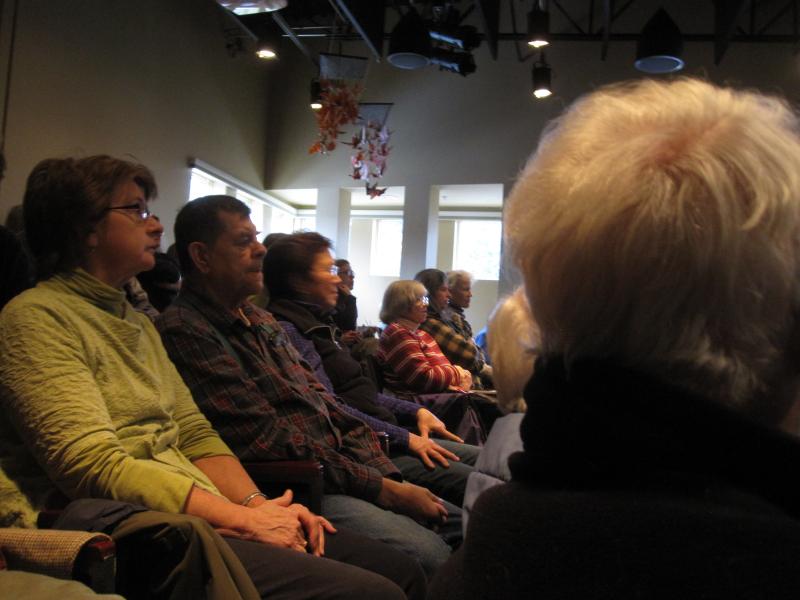Citizens interested in an event called “Healing in the Dawnland: An Introduction to Indigenous Struggles for Sovereignty in Maine” packed the Porter Meeting Hall at Skidompha Library in Damariscotta on Saturday, Jan. 7.
Shri N.A. Garland and Alex Jackimovicz from the Alliance for Economic Democracy, Maine Chapter co-presented the event, which consisted of discussion and three videos. “First Light” examined the history and effects on Maine Wabanaki children taken from their families and tribes and placed into Maine’s foster care system, where many of them experienced abuse and neglect. According to the 2015 findings of Maine’s Wabanaki-State Child Welfare Truth and Reconciliation Commission, between 2002 and 2013, they were five times more likely than white children to end up in foster care. The Wabanaki Federation consists of four tribes: Maliseet, Mi’kmaq, Passamaquoddy and Penobscot.
The findings read in part: “We take these essential numbers, the disproportionate removal over time, the gaps in identification, and we link them to still present realities of racism and dispossession and we frame them as evidence of cultural genocide against Wabanaki people.”
An audience member asked why were Native children taken at five times the rate of non-native children in Maine.
Former Maine Senator Chris Johnson answered the question in part by explaining that, “There's a great deal of poverty on the reservation. They’re not able to practice effectively what sustained them on their own lands, traditionally. They've lost a lot of the ability for hunting and fishing for sustenance to provide basic needs,” he said.
As Senate Chair of the Marine Resources Committee and as a member of the Judiciary Committee, Johnson worked with the Wabanaki on a number of tribal issues, as well as on bills impacting the tribes. “They can't, in our society, do things as a community because they have no means to raise funds. The federal government holds the land in trust for them and they cannot mortgage it. They cannot secure capital. I suspect that one of the reasons is a disrespect for their sophistication and philosophies. These things contribute to believing that a child is better off somewhere else. We use the same metrics in making these decisions we do with non-native cultures,” he said.
Garland added that, “The traditional Native family structure includes uncles and aunties and extended aunties and uncles and grandparents, a network of community and family that the DHS numbers don't see.”
The next two films, “The Penobscot: Ancestral River, Contested Territory”, and “Penobscot: A Fight for Ancestral Waters” highlighted an ongoing battle between the State of Maine and the Penobscot Indians over water rights.
William Schneider, the state’s Attorney General from 2011 to 2013, determined in a letter that the state has the authority to charge people with fishing regulation violations and water safety rules regarding the waters surrounding the Penobscots’ island reservation. The Penobscot tribe, which has acted as the stewards of the river for centuries, filed a lawsuit claiming that the reservation includes the river water. A final ruling about three years after the original 2012 letter concluded that the state was correct in its assumptions. Appeals are ongoing.
According to the films, a couple of issues are at stake. One involved the claiming of water rights by the state without the tribe’s knowledge. The other concerns the water quality of the river. The tribe alleges that, under state control, paper plants and lumbering operations upstream are allowed looser restrictions on municipal discharges, and that the tribe is powerless to change this. Maine Attorney General Janet Mills, who takes the state’s position, inherited the lawsuits after Schneider’s departure, and the battle wages on.
Toward the end of the event, advice was offered on how to become advocates and allies for the Wabanaki people. Several websites were mentioned, one of them being Maine Wabanaki Reach, which supported the Truth and Reconciliation Commission and focuses on Wabanaki health, wellness, self-determination and ally-building.
An audience member with a Native background, who went through the foster system, urged people to educate themselves by meeting the tribes. “We're so far removed from Washington and Aroostock counties and the Maritimes. Make the trip up north and see what people are dealing with. Read, look at art, listen to music, just listen. There are a lot of resources,” she said.






























